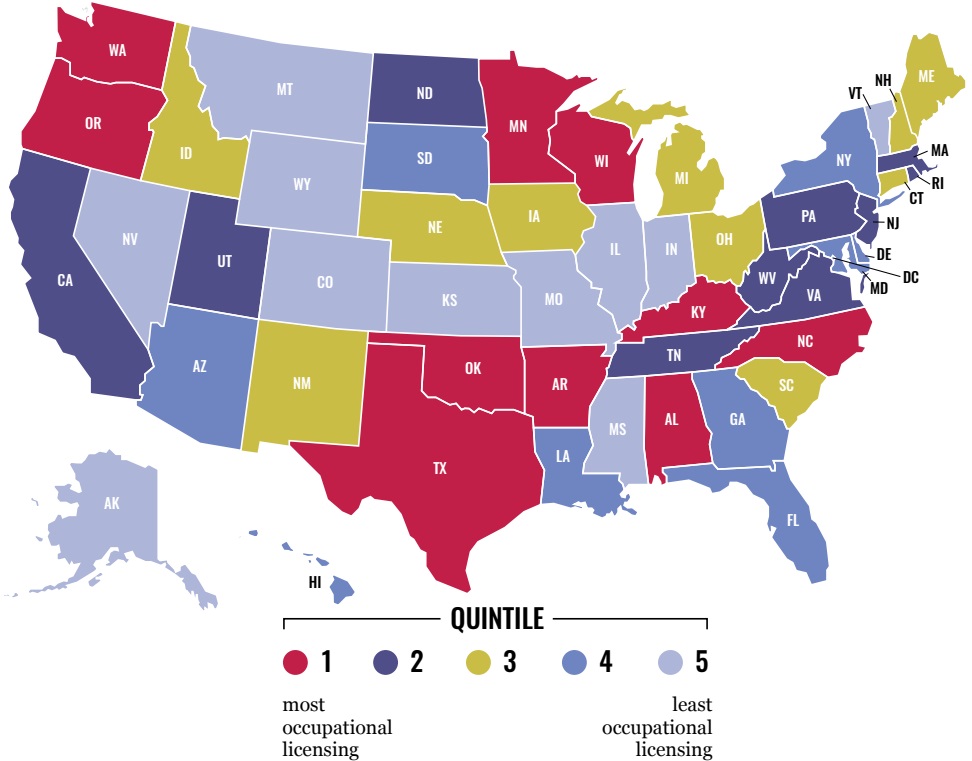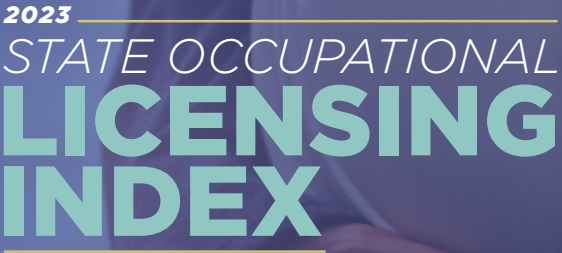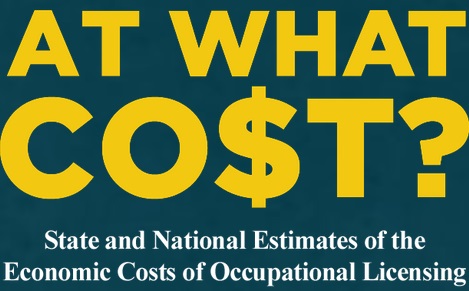I wrote three columns about occupational licensing in 2017 (here, here, and here), but have since neglected the issue.
It’s time to revisit the issue, and we’ll start with this John Stossel video.
One of the reasons I’m writing about the issue is that the Archbridge Institute issued a report last year that ranked states based on the degree to which they required workers to get permissions slips from government in order to work.
The report was written by Noah Trudeau of Saint Francis University and Edward Timmons of West Virginia University, and it includes a very helpful map. Light blue states are the best and red states are the worst.
Here are some of the findings from their overview.
Occupational licensing affects more than 20 percent of workers in the United States. The extent of occupational licensing greatly differs across states. From both a research and public policy standpoint, it is important to have a comprehensive measure of occupational licensure across states and occupations. The purpose of the State Occupational Licensing Index (SOLI) is to help fill in this gap. The report contains four main sections: an introduction to the index, an overview of our methodology, a comparison to other database rankings, and state profiles for all 50 US states plus DC. …In 2023, the state with the highest occupational licensing burden is Arkansas (#1), followed by Texas (#2), Alabama (#3), Oklahoma (#4), and Washington (#5); the state with the lowest occupational licensing burden is Kansas (#51), preceded by Missouri (#50), Wyoming (#49), Indiana (#48), and Colorado (#47).
Congratulations to Kansas for having the most laissez-faire approach. Arkansas, by contrast, deserves scorn.
Why scorn for Arkansas? Let’s look at some additional analysis.
In 2018, Morris Kleiner and Evgeny Vorotnikov authored a study for the Institute for Justice about occupational licensing. Here are some of their results.
…licensing is frequently wasteful. In preventing people from working in the occupations for which they are best suited, licensing misallocates people’s human capital. In forcing people to fulfill burdensome licensing requirements that do not raise quality, licensing misallocates people’s human capital, money and time. And with its promise of economic returns over and above what can be had absent licensing, licensing encourages occupational practitioners and their occupational associations to invest resources in rent-seeking instead of more productive activity. Taking these misallocated resources into account, we find potential costs to the economy that far exceed those from deadweight losses…we find licensing costs the American economy $183.9 billion in misallocated resources… Assuming the 15 percent national returns, we find licensing costs the American economy $197.3 billion in misallocated resources.
That’s the economic cost to the country.
But don’t forget that hundreds of thousands of Americans lose employment opportunities because of their restrictive regulations.
So there is a substantial human cost as well.
Let’s close with a bit of good news. Veronique de Rugy wrote a few years ago that there are reform efforts.
The beauty of American federalism is that it allows states to try out different policies and see what works well and what does not. The state of Arizona is putting this flexibility to good use. After implementing a moratorium on occupational-licensing requirements in 2015, the state passed legislation to recognize occupational licenses from other states last year. Going against special-interest groups in various industries whose members would prefer to face as little competition as possible, Arizona is saying that it is open for all business and welcomes competition. As a result, Arizona is effectively launching a healthy competition for workers among the states themselves. …Faced in part with this competition from Arizona, other states are finally getting serious about reforming their own occupational-licensing requirements. …Shoshana Weissmann and Jarrett Dieterle write that many other states are following in Arizona’s footsteps, as evidenced by the fact that in 2020 alone “universal recognition bills are being pursued in Virginia, West Virginia, California, Ohio, Missouri, Georgia, New Hampshire, Indiana, and New Jersey.” …Let’s hope that all the states will follow Arizona’s lead and catch the reform bug so they, too, will free their workers, consumers, and economies from ridiculous licensing requirements.
And other states are catching up, as Veronique hoped.
Marc Joffe has an article about positive developments in Ohio and Nevada.
And here are some excerpts from a Forbes column by Patrick Gleason.
…there is another policy trend emerging that, like income tax relief and greater educational choice, is making states more attractive to workers and employers. That trend is the push by policymakers to remove or mitigate the barriers to employment that state occupational licensing requirements have become. …
Universal License Recognition (ULR)…Nearly half of the states now have a ULR law. But four years ago, zero did, underscoring how quickly the ULR movement has grown. Former Governor Doug Ducey (R) made Arizona the first state to enact ULR back in 2019, with positive results observable in the subsequent years. …by also making occupational licensing requirements less taxing for new residents to comply with, both in terms of time and money, reform-minded governors and state lawmakers have honed in on a new way, like with rate-reducing tax reform, to make their states more attractive places to live, work, do business, and support a family.
This is great news.
Just as it is great news that states are cutting taxes and enacting school choice.
More evidence that federalism is the way to go.
P.S. Arizona’s former Governor, Doug Ducey, was remarkably good on licensing and many other issues.




No comments:
Post a Comment